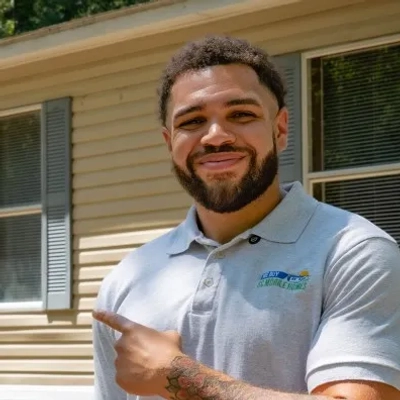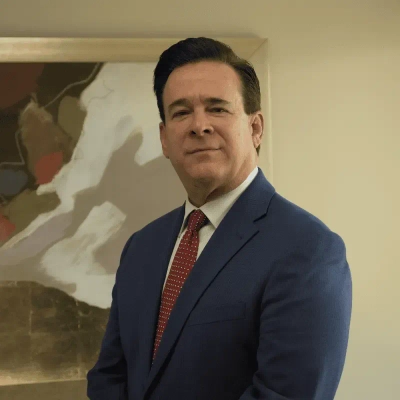25 Ways to Balance Approachability and Authority as a Small Business Leader
Striking the right balance between approachability and authority is a crucial skill for small business leaders. This article explores expert-backed strategies to help you navigate this delicate balance effectively. Drawing from the insights of seasoned professionals, we'll delve into practical approaches that foster open communication, maintain clear boundaries, and cultivate a positive work environment.
- Listen Genuinely, Guide Decisively
- Foster Open Communication with Clear Boundaries
- Balance Empathy and Firm Expectations
- Empower Team while Maintaining Decision Authority
- Blend Accessibility with Professional Standards
- Create Trust through Transparency and Accountability
- Lead by Example, Decide with Confidence
- Cultivate Psychological Safety and Clear Direction
- Demonstrate Reliability and Approachable Leadership
- Unite Team through Shared Purpose
- Stay Real, Set Boundaries, Steer Confidently
- Use Transparency to Reinforce Strategic Decisions
- Combine Humanity with Structured Problem-Solving
- Establish Credibility while Remaining Mission-Driven
- Be Available and Uphold Rules Consistently
- Show Empathy, Maintain Firm Professional Boundaries
- Lead from Regulation, Not Reaction
- Listen Attentively, Proceed Decisively
- Maintain Open Door and Quality Standards
- Encourage Questions, Provide Clear Direction
- Balance Hands-On Work with Final Accountability
- Build Trust-Based Authority through Genuine Rapport
- Listen First, Make Tough Calls
- Blend Practical Experience with Decision-Making Authority
- Demonstrate Expertise while Remaining Approachable
Listen Genuinely, Guide Decisively
I balance approachability by prioritizing genuine listening when homeowners share their stressful situations, while my authority stems from delivering clear, honest solutions that protect their best interests. Recently, a couple days away from foreclosure, a homeowner was paralyzed by fear after bad experiences with investors. I first created space for them to express their frustrations without interruption, then firmly guided them through our cash offer process, explaining each step and why immediate action was critical to stop the auction. That combination of empathy and decisive direction not only saved their home but reinforced how trust is built when people feel understood yet confidently led.

Foster Open Communication with Clear Boundaries
From the very first interaction with a new employee or contractor, a leader begins setting the tone for their working relationship. In a small business, where roles often overlap and communication is constant, establishing this balance between being approachable and maintaining authority is essential.
Being approachable starts with showing genuine care and openness. It means creating an environment where team members feel comfortable sharing ideas, asking questions, and even admitting mistakes. Approachability looks like being friendly, transparent, and professional. But warmth alone isn't enough. Authority is built through clear expectations, consistency, and firm but fair boundaries. When people know where those lines are, they feel more confident operating within them.
I learned this balance was most crucial during a period of rapid growth in my business. As we took on new clients and expanded our team, I noticed that a few team members were missing deadlines and communicating inconsistently. My instinct was to remain understanding and flexible, but that leniency quickly led to confusion and frustration across the team. I realized that being a supportive leader also meant being direct and holding people accountable. Through clear performance check-ins, transparent expectations, and consistent feedback, we rebuilt trust and strengthened our operations.
As leaders, one of our greatest responsibilities is not only managing people but helping them grow. That includes identifying each person's strengths, offering opportunities to stretch their skills, and addressing gaps when follow-through slips. Accountability isn't about discipline. It's about development. When we guide with both empathy and structure, our teams feel supported and challenged.
Ultimately, balance is key. Growing businesses need leaders who can foster genuine connection while upholding the standards that drive success. The goal isn't just to have staff who work for your business, but to nurture a team that grows with it.
Balance Empathy and Firm Expectations
I balance approachability and authority by creating a culture of open communication while setting clear expectations and boundaries. I encourage my team to share ideas, raise concerns, and ask questions without fear of judgment, but I also make it clear that safety, service quality, and professionalism are non-negotiable. Regular check-ins, informal conversations in the field, and visible involvement in day-to-day operations help reinforce that I am accessible, while consistent enforcement of standards maintains my authority.
This balance proved crucial when a technician repeatedly cut corners on treatment protocols to save time. I needed to address the behavior firmly to protect customer satisfaction and company reputation, but I also wanted the technician to feel supported rather than alienated. I held a direct, yet respectful conversation that outlined the consequences, while also listening to the challenges they were facing and offering guidance. The technician corrected their approach, felt valued, and the team saw that standards were enforced fairly, strengthening both trust and accountability across the business.

Empower Team while Maintaining Decision Authority
As a leader in a small business like ALP Heating LTD., balancing approachability with authority is essential for fostering a positive work culture and ensuring operational effectiveness. It's a tightrope walk that requires empathy, clear communication, and a firm understanding of the business's goals. I believe that being approachable allows team members to feel valued and empowered, which in turn drives innovation and collaboration. However, maintaining authority is critical to making decisive choices that affect our customers and the integrity of our services.
One specific situation that highlights this balance occurred last winter during an unexpected surge in emergency HVAC repair requests due to a severe ice storm. Our team was under pressure, and I knew it was crucial to mobilize quickly while also maintaining morale. I gathered our technicians for a meeting, where I emphasized the urgency of our commitment to customer care and safety, but also encouraged open dialogue. I wanted them to voice their concerns and ideas on how we could tackle the increased workload effectively.
By fostering an environment where everyone felt comfortable sharing their thoughts, we were able to brainstorm practical solutions, including adjusting schedules and reallocating resources. This collaboration not only empowered my team but also ensured that we could meet our customers' urgent needs without compromising service quality. Ultimately, we managed to respond to all requests promptly, reinforcing our reputation for reliability in a time of crisis.
I often remind my team that while I hold the final decision-making authority, each of their insights is invaluable. This approach not only builds trust but also cultivates a sense of shared ownership over our company's mission. At ALP Heating, we are family-owned and community-oriented, which shapes our leadership style. We prioritize clear communication and a customer-focused mindset, ensuring that our clients receive tailored HVAC solutions that account for specific needs and local climate challenges.
By nurturing an approachable yet authoritative leadership style, I aim to create an environment where our team feels supported and motivated to deliver exceptional service to our clients, reinforcing our commitment to safety and quality workmanship. This balance is pivotal in our mission to provide comfort and peace of mind to families across the Greater Toronto Area.

Blend Accessibility with Professional Standards
Running a Miami personal injury firm has taught me that leadership requires equal parts empathy and firmness. I strive to be approachable so my team feels comfortable sharing concerns, but I also maintain clear expectations to ensure every case meets our professional standards. One moment that tested this balance came during a medical malpractice case that required quick evidence review over a holiday weekend. My team was tired, and I could sense frustration building.
Instead of issuing strict directives, I called an impromptu meeting to explain the urgency and how this case could change a client's life. I stayed alongside them that entire weekend, reviewing depositions and drafting arguments together. By working shoulder to shoulder, I showed that leadership means standing with your people, not above them.
The team's energy shifted immediately. They went from exhaustion to purpose, knowing their efforts had meaning. We secured a successful settlement, but more importantly, everyone left that experience feeling valued and united. That balance of firm accountability mixed with human understanding is what sustains our culture and allows my Miami personal injury firm to deliver justice with both professionalism and heart.
Create Trust through Transparency and Accountability
I maintain approachability by staying hands-on and accessible, but my authority comes from making decisive calls when homeowners need direction most. Last month, I worked with a widow who was overwhelmed by choosing between multiple cash offers on her late husband's property - she kept flip-flopping between decisions because each buyer was pressuring her differently. I cleared my schedule to spend an afternoon with her, walking through each offer without any sales pressure, then confidently recommended the best option based on her specific needs and timeline. By being patient and present first, then stepping up as the expert when she needed guidance, we closed smoothly and she felt completely supported throughout the process.

Lead by Example, Decide with Confidence
In a small business, you don't get to hide behind titles—your team sees how you handle everything, good or bad. For me, finding balance meant realizing that being approachable isn't about being everyone's best friend; it's about creating space for honest conversations without losing direction. Last year, one of our technicians made a mistake on a termite treatment that cost us a follow-up visit. He came to me before I even found out because he trusted I'd listen instead of react.
I thanked him for owning it, but we still reviewed what went wrong and added new checks to prevent it from happening again. That moment showed the team that accountability and respect go hand in hand. If people know you'll listen, they're more likely to take responsibility instead of hiding mistakes—and that's where real leadership shows up.

Cultivate Psychological Safety and Clear Direction
I achieve a balance between being approachable and being an authority by being clear with decision-making—but strong in accountability to those decisions. My team knows they can ask how or why we do things—but when we make a decision, we are moving forward as a group. This keeps channels open without blurring some lines of leadership.
An example of one clear moment when this was important was during a time when we had to tighten our budget. I engaged my team in identifying where to tighten our budget but made the final decision myself. Because I brought them into the conversation early, there was engagement and full participation even when the decisions were difficult.
The revealing element of this dynamic was that although being approachable won me trust, consistency won me respect. When the team feels connected to how their leader operates, it leads to a theory of authority becoming collaboration versus control.
Demonstrate Reliability and Approachable Leadership
Finding the right balance between approachability and authority comes down to creating psychological safety while still providing clear direction. At Eprezto, I've made it a practice to openly acknowledge when my decisions don't work out as planned, directly telling my team, "That was my call, and it didn't work." This approach maintains my authority as the decision-maker while showing vulnerability that makes me more approachable and builds trust. It's created a culture where team members feel safe to take risks and share both successes and failures, which has been crucial for driving innovation in our small business environment.

Unite Team through Shared Purpose
Balancing approachability and authority in a small business is something I've learned over many years running Jumper Bee. I want my team to feel comfortable sharing ideas or raising concerns while still understanding that I'm responsible for making final decisions. I focus on leading by example, listening actively, showing respect, and being present in our daily work. This helps my team trust me and understand my role without feeling intimidated.
There have been moments when this balance was especially important. For example, a team member once raised a concern about an upcoming task that needed immediate attention. I needed to make a quick decision, but I also wanted to show that I valued their input. By explaining my choice clearly and acknowledging their perspective, I was able to handle the situation effectively while keeping the team confident and engaged.
Open communication is central to maintaining this balance. I make a point to ask questions, provide feedback, and recognize good work while addressing issues privately. This approach allows the team to feel empowered and supported while also understanding the responsibilities that come with their roles.
Leadership, for me, is about being reliable and approachable at the same time. When the team works together smoothly and clients leave happy, it's a clear sign that this balance not only strengthens our operations but also makes the experiences we create more enjoyable for everyone involved.

Stay Real, Set Boundaries, Steer Confidently
There are moments in leadership when listening becomes more powerful than leading. During a season of unexpected supply challenges, I brought the team together to explore every possible solution. Their creativity and dedication revealed ideas I might have missed on my own. When the question arose about compromising our organic certification to speed up production, I stood firm. Preserving integrity mattered more than convenience, and that decision reflected our commitment to quality and trust.
That experience reminded me that authority gains real strength when it is guided by empathy. By listening first and deciding later, I showed that leadership is not about hierarchy but about shared purpose. The team understood that every firm decision begins with respect and ends with responsibility toward the values that define who we are. It strengthened our unity and deepened our belief in doing what is right.

Use Transparency to Reinforce Strategic Decisions
Honestly, I think the balance comes from being real with people. I want my team to feel like they can walk into my office, shoot me a text, or bring up an idea without feeling nervous. At the same time, I've learned that being approachable doesn't mean being a pushover. When it's time to make a decision, you've got to stand firm and follow through.
One time this really mattered was when one of my businesses was growing fast and everyone wanted input on how to do things. I loved that they cared, but it started to get messy because people were skipping their managers and coming straight to me. I had to step back and say, "Look, I value what you're bringing, but let's make sure we're keeping things organized." Once we reset those boundaries, everything started running smoother again.
To me, good leadership is about staying approachable but clear. You listen, you care, but you also lead with confidence so your team knows someone's steering the ship.

Combine Humanity with Structured Problem-Solving
I balance the two by using transparency to reinforce authority, meaning I openly share the "why" behind unpopular decisions, making tough calls feel strategic rather than arbitrary. This approach proved crucial when we had to pivot our entire product roadmap; because the team understood the market data and reasoning behind the shift, they maintained commitment and trust instead of feeling blindsided or questioning my leadership.

Establish Credibility while Remaining Mission-Driven
I've always believed that leadership works best when people see you as human before they see your title. Our business involves high-stress decisions tied to costs, compliance, and patient impact. Being approachable helps people speak up early about problems that could otherwise become expensive mistakes. However, authority ensures those conversations lead to structured solutions rather than endless brainstorming. One time this balance was critical was during a compliance audit that revealed overlooked vendor documentation.
The discovery could have easily turned into finger-pointing and blame-shifting across departments. Instead, I called a meeting, acknowledged the oversight, and assigned shared responsibility rather than isolating individuals. That choice opened collaboration instead of defensiveness, and we passed the follow-up inspection flawlessly. People trusted the process because they trusted the tone: firm, fair, and human all at once.

Be Available and Uphold Rules Consistently
My authority comes from my background as a high-volume real estate agent, which gives me credibility on market strategy, but I stay approachable by being deeply mission-driven. I once worked with a seller who felt their manufactured home was "less than" a traditional property, so I established trust by providing the same rigorous market analysis I would for any home. Then, I connected with them by sharing our vision for renovating it for a new family, turning a simple transaction into a positive contribution to our community.

Show Empathy, Maintain Firm Professional Boundaries
During those fast bridge loan closings, my team needed to know two things: they could call me anytime, and I'd give them a straight answer. Once, an underwriter called at 10 PM about one signature. I picked up. That meant they called me directly the next day instead of hiding it. But I also told them, "Yes, we need that signature, right before the morning cutoff." So the funding hit. Being open eased the tension, but the rules were still the rules.

Lead from Regulation, Not Reaction
In my years managing a family-run law office, I've learned that clients appreciate warmth and understanding, but also need direct legal advice. For example, when guiding immigrant clients through complex USCIS processes, listening compassionately eased their worries, but it was essential to lay out firm boundaries so expectations stayed realistic. My advice is to show empathy, but don't hesitate to be firm when the situation demands it; it builds respect and trust.

Listen Attentively, Proceed Decisively
I balance being approachable and maintaining authority by leading from regulation rather than reaction. When my nervous system is grounded, I can stay open, listen fully, and still hold clear boundaries. That combination naturally earns trust and respect.
One situation where this balance was crucial was during a client project where expectations began to drift. Instead of tightening control or over-explaining, I paused, regulated, and re-entered the conversation from a calm authority. That shift in energy changed everything. It opened dialogue, clarified scope, and reinforced mutual respect. It reminded me that authority isn't about force; it's about stability that others can feel safe in.

Maintain Open Door and Quality Standards
You have to listen, but you're still the one in charge. When we were acquiring a mobile home community, residents were worried about rent. We held a Q&A just to let them get it all out. But then I had to lay it out: here's the timeline, here are the dates. We were still going to proceed. People felt heard because we let them speak, and the team knew the plan was solid because I didn't waver.

Encourage Questions, Provide Clear Direction
Here's what managing rehab crews taught me: Be hard-nosed about quality standards but keep your door open. My team caught the small problems before they got expensive because they knew they could just walk over and ask me a question. So you hold the line on what matters, but you also make it clear you're there to help them get the job done, not just to bust their chops.
Balance Hands-On Work with Final Accountability
When GRIN grew from 50 to hundreds of people, I had to figure out how to lead effectively. I initiated open quarterly meetings where anyone could ask anything, including tough questions. I would listen attentively to everything. Then, I would stand up and explain precisely what we were going to do next and why. People seemed to appreciate this approach. They knew their voices were heard, but they also understood that the ship had a captain.
Build Trust-Based Authority through Genuine Rapport
Balancing approachability with authority is like balancing safety on a steep roof. You have to be close enough to help, but far enough to maintain the structural integrity. My approach to leadership balance is simple: I join the crew's hands-on work, but I always own the final, non-negotiable decision on structural integrity.
I am approachable because I spend time on the job site wearing a tool belt, carrying shingles, and sweating alongside my crew. That hands-on shared experience builds trust and respect immediately. They see I understand the reality of their work.
However, I maintain authority by making it clear that I am the final point of accountability for structural integrity. If a crew chief suggests a quick fix that violates a hands-on quality standard, I stop the job immediately. I don't yell; I simply say, "That method fails the long-term integrity test, and I own the warranty. We do it the right way."
One situation where finding this balance proved crucial was during the installation of a complex metal roof. The foreman wanted to skip a tedious, hands-on sealant process because the client was pressuring him for speed. I stood on the roof, listened to his frustration, and then spent twenty minutes personally demonstrating exactly why that sealant was the one structural element that would prevent catastrophic failure in ten years. My authority came from the hands-on proof, not the title. The best way to lead is to be a person who is committed to a simple, hands-on solution that always chooses structural integrity over speed.
Listen First, Make Tough Calls
As a leader, I have worked hard to build rapport with my team. I want to be a leader whom they trust and respect. When you have trust and respect from those you lead, you gain a more genuine, fruitful kind of authority. Your employees choose to follow you and honor your authority, rather than following your authority out of fear or feeling like they have no other choice.

Blend Practical Experience with Decision-Making Authority
Managing tenants and my real estate team is a fine line to walk. I remember one renovation project that went completely off the rails. I heard everyone out, but in the end, I had to make the tough call on the contractor to get things moving again. I've found that as long as you listen first, people actually appreciate it when you make the final decision. It gives them some certainty.

Demonstrate Expertise while Remaining Approachable
I've always believed that approachability starts with remembering where you came from—whether it was flipping sneakers or working construction with my dad—and authority naturally follows when people see you genuinely know your craft. I faced this balance head-on when a homeowner needed extensive foundation repairs on a property we were buying; instead of just dictating the fix, I actually showed up with my tools to demo the old work alongside my crew, explaining the construction process step-by-step to the nervous seller. That moment proved you can be both the boots-on-the-ground guy people trust and the decision-maker who ensures the job gets done right.








